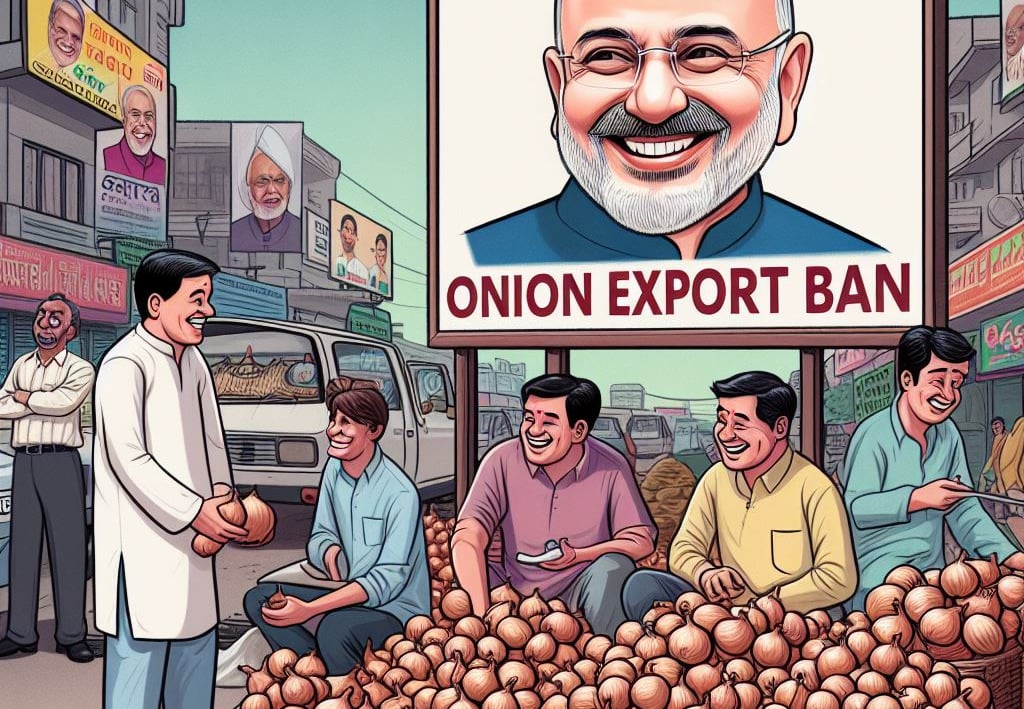Bharat Bans Onion Exports: Savior or Saboteur?
Explore the controversy surrounding India's onion export ban. Delve into the political and agricultural dynamics, shedding light on the impact on farmers, middlemen, and politicians. Uncover the complexities
ENGLISH ARTICLE
Athish Ravikanth
12/11/20232 min read


Hello Friends,
Greetings to all! Today, we're going to talk about a recent decision by the Indian government that has caught everyone's attention—the export ban on wheat, non-basmati rice, and now onions.
Do you think this decision is in the best interest of the people, or is there a political motive behind it? Let's break down the details and get to the bottom of the story.
Onions are a crucial crop, especially in Maharashtra, home to India's largest onion market in Nashik district's Lasalgaon.
Typically, onions undergo two harvests a year: the first, known as pink onions, in March-April, and the second in October-November known as GARVA. The shelf life varies, with the first harvest lasting 7-8 months and the second only 15-25 days.
Now, you might be wondering about the government's decision to ban exports. To understand this, let's look at the bigger picture.
India not only consumes a large quantity of onions domestically but also exports them to countries like Bangladesh, Sri Lanka, Malaysia, Indonesia, Vietnam, Dubai, Saudi Arabia, Qatar, and other GCC countries. To prevent a shortage and price hike in India, the government imposed a minimum export price of $800 per metric ton on August 19th 2023.
Despite this restriction, onion exports continued in large volume. This led to serious concerns.
Above all, this year, unforeseen heavy rainfall around November 28-29 damaged Maharashtra's onion crop as well as grape crop. This untimely rain, due to the El Niño effect, has severely damaged the onion crop and is also expected to continue, affecting various crops across Bharat next year as well.
The damaged crop, with a limited shelf life and the next harvest due until March or April 2024, will inevitably cause a shortage in India. This scarcity will drive up prices, impacting the common people. In this context and in my opinion, the government's decision is a prudent move in the interest of the people.
You might argue that this decision negatively impacts our farmers. However, considering the crop damage and the subsequent increased demand, farmers have the opportunity to sell their produce at favorable prices. After all, what does it matter to a farmer whether their crop is sold within India or abroad, as long as they get a fair price?
Yet, amidst this, there are two groups that will face challenges—middlemen and politicians.
Middlemen play a pivotal role in market price fluctuations, exploiting both farmers and consumers. Politicians supporting middlemen or with significant investments in them will also encounter difficulties. I believe it's better for only those two categories to suffer, rather than the entire nation.
In the coming days, these two categories—middlemen and certain politicians—will likely raise concerns by protest, rallies and other means.
Also for farmers looking to maximize earnings, selling directly to exporters or other buyers, bypassing middlemen, is a viable option. The involvement of middlemen only prolongs the agony.
As for exporters, it's a valuable lesson: never rely solely on one commodity. Diversify by exploring allied products. For instance, if your client is interested in onions, they may also need potatoes, garlic, dry red chili and other commodities as well.
So, whether you're adding allied products or considering value addition, remember that diversification is key.
If you're thinking of starting an export business and want insights into choosing the right product, market selection, customer acquisition, deal closure, market analysis, and leveraging data analysis, feel free to reach out or leave a comment below.
Stay tuned for the next article, and until then, do take care of yourself.
#OnionExportBan #OnionCrisis #OnionPolitics #OnionDiversification #OnionStories
TRAVEL & TRADE
Bangalore, India